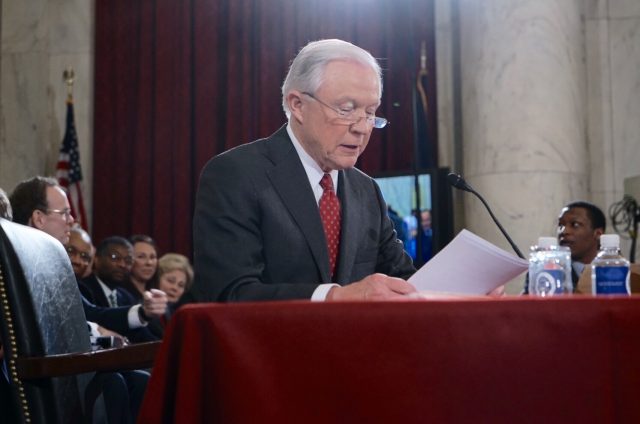Sessions dismisses allegations of racial insensitivity at confirmation hearing
WASHINGTON – Attorney General nominee Sen. Jeff Sessions (R-Ala.) on Tuesday dismissed accusations that he is insensitive to the rights of minorities and said if confirmed he would vigorously enforce civil rights laws.
“I deeply understand the history of civil rights in our country and the horrendous impact that relentless and systemic discrimination and the denial of voting rights has had on our African-American brothers and sisters. I have witnessed it,” Sessions told the Senate Judiciary Committee.
“We must continue to move forward and never backward.”
Protestors dressed as Klansmen mocked Sessions shortly before the hearing began but Capitol Police immediately removed them.

Members of the anti-war group Code Pink held up signs protesting Sessions’ nomination. One Code Pink protestor was removed while interrupting Sen. Susan Collins (R-Maine) who introduced the nominee to the committee.
Two other protestors were removed after shouting: “No Trump, No KKK, No fascist USA.”
Sessions was the first member of Congress’ upper chamber to endorse President-elect Donald Trump who nominated him to head the Justice Department in mid-November.
He previously served as a U.S. Attorney and also Attorney General of Alabama before being elected to the Senate in 1996.
President Ronald Reagan nominated Sessions to the U.S. District Court for the Southern District of Alabama in 1986 but the Senate declined to confirm him largely due to concerns about his philosophy regarding the enforcement of civil rights legislation.
During those confirmation hearings an African-American assistant U.S. Attorney who had worked with Sessions in the Justice Department testified that Sessions had referred to him as “boy” and also told the committee that Sessions had previously had a favorable opinion of the Ku Klux Klan until discovering that “they smoked pot.”
Sessions testified that many of the comments he is alleged to have made were either never said or taken out of context.
Sessions reiterated in his opening statement: “I abhor the Klan and its hateful ideology,” and also reaffirmed that he had never referred to the NAACP as “un-American.”
Sen. Dianne Feinstein (D-Calif.), who is the ranking Democrat on the committee, inquired as to whether Sessions still believes the 1973 Roe v. Wade Supreme Court decision which legalized abortion was wrongly decided.
“I believe it violates the Constitution,” Sessions said, but also maintained that that decision unquestionably renders abortion legal and that as Attorney General he would be duty bound to enforce that law despite opposing Roe.
Feinstein also asked Sessions if he agreed that the Supreme Court’s 2015 decision that legalized same-sex marriage was final.
“The Supreme Court has ruled on that, the dissents dissented vigorously, but it was 5-4 and… I will follow that decision,” Sessions said.
Sen. Lindsey Graham (R-S.C.) inquired as to whether Sessions would support legislation banning Muslim immigration to the U.S., as President-elect Donald Trump previously advocated for.
“No,” Sessions said.
Sen. Patrick Leahy (D-Vt.) also asked Sessions about his views on a potential Muslim ban.
“I have no belief and do not support the idea that Muslims as a religious group should be denied admission to the United States. We have great Muslim citizens who have contributed in so many ways,” Sessions said. “Americans are great believers in religious freedom and the right to exercise their religious beliefs.”
Judiciary Chairman Chuck Grassley (R-Iowa.) asked Sessions if he would recuse himself should Hillary Clinton’s email investigation be reopened or if the Clinton Foundation became the target of a federal probe.
Sessions said he would.
Sen. Sheldon Whitehouse (D-R.I.) asked Sessions if he had ever participated in the “lock her up,” chant in reference to Hillary Clinton’s email scandal that had become commonplace at Trump campaign rallies.
Sessions said he did not, but did concede he had heard the chant at Trump’s rallies.
Sessions challenged suggestions by Sen. Dick Durbin (D-Ill.) that as Attorney General the Alabama senator could not be trusted to amicably facilitate immigration reform, but maintained that illegal immigration should not be tolerated.
“I believe the American people spoke clearly in this election,” Sessions said. “I believe they agreed with my basic view and I think it’s a good view, a decent view, a solid legal view for the United States of America that we create a lawful system of immigration that allows people to apply to this country and if they’re accepted, they get in; if they’re not accepted, they don’t get in.”
The hearing was sporadically interrupted by protesters who shouted insults and at times the nominee was interrupted while speaking.
Sen. Cory Booker (D-N.J.) testified against Sessions on Wednesday, which marked the first time a sitting senator opposed the nomination of a sitting colleague.
“Senator Sessions has not demonstrated a commitment to a central requisite of the job, to aggressively pursue the Congressional mandate of civil rights, equal rights and justice for all of our citizens,” Booker told the committee.
This article is republished with permission from Talk Media News

Bryan is an award-winning political journalist who has extensive experience covering Congress and Maryland state government.
His work includes coverage of the election of Donald Trump, the confirmation hearings of Supreme Court Justice Brett Kavanaugh and attorneys general William Barr and Jeff Sessions-as well as that of the Maryland General Assembly, Gov. Larry Hogan, and the COVID-19 pandemic.
Bryan has broken stories involving athletic and sexual assault scandals with the Baltimore Post-Examiner.
His original UMBC investigation gained international attention, was featured in People Magazine and he was interviewed by ABC’s “Good Morning America” and local radio stations. Bryan broke subsequent stories documenting UMBC’s omission of a sexual assault on their daily crime log and a federal investigation related to the university’s handling of an alleged sexual assault.

